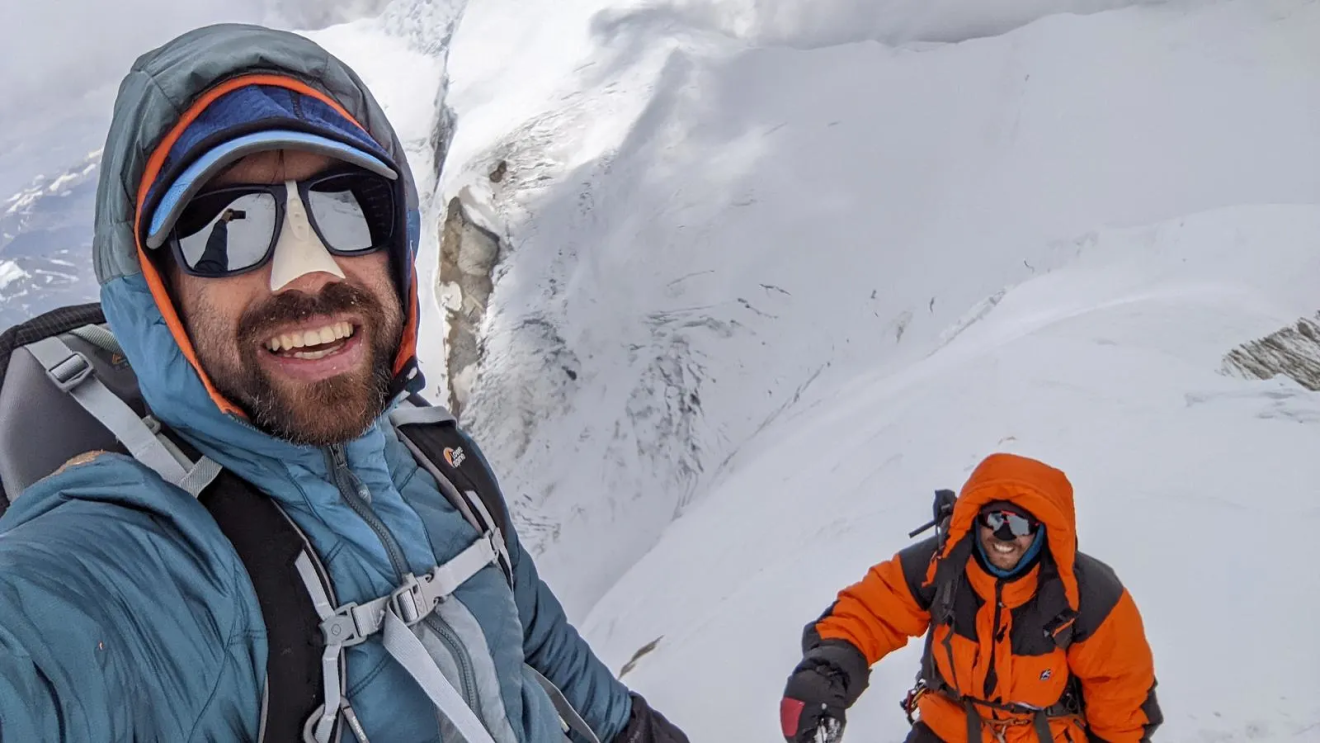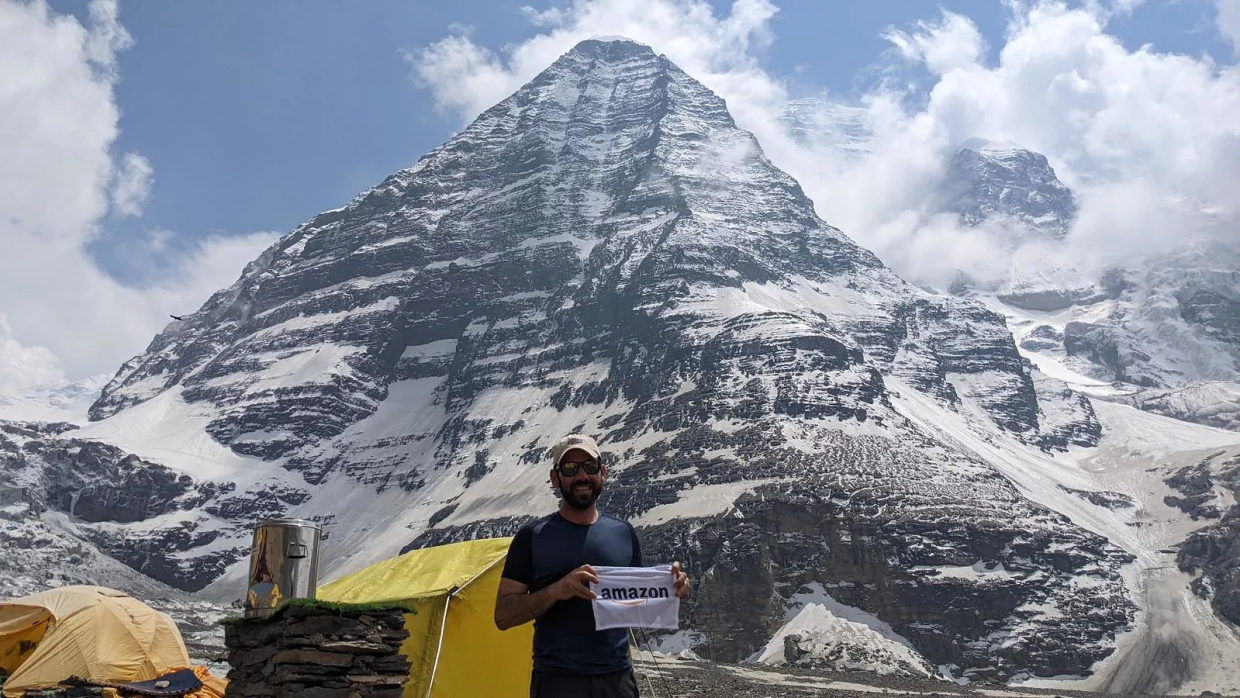Amazon’s Leadership Principles – which you can read in full here - describe how we do business, how leaders lead, and how we keep the customer at the center of our decisions.
In April 2022, I attempted to climb Dhaulagiri (8,167m) with my climbing partner, without oxygen or other assistance. During the long months of preparation and when making decisions in the process, I often found myself relying on Amazon’s culture and Leadership Principles. Here’s my story.
Think Big
No oxygen, no Sherpa, no pulling on fixed ropes—that was our chosen approach to Dhaulagiri in Nepal, which at 8,167 meters is the seventh tallest mountain in the world. This is definitely not the common approach to such a high mountain. Most climbers are commercial clients who rely heavily on Sherpa support, fixed ropes along the route, and (usually) bottled oxygen to summit these Himalayan giants. But Assaf, my climbing partner, and I wanted to see what it meant to attempt a climb this big on our own—every decision, every breath.

We started to prepare in January, but the first discussions began a year earlier. Assaf and I have been climbing together since 2015, and we share many views on climbing and life, one of which is pursuing growth through bold and ever-increasing challenges. This would be the latest one of those challenges.

Insist on the Highest Standards
In preparation, I learned that I should focus only on controllable inputs - the variables you can influence that will make a difference. In climbing, these normally include fitness, equipment, and logistics. And so, during the months leading up to the expedition, I became consumed. Every available hour was spent reading and training. Weekends were devoted to longer hikes. My wife and two girls, meanwhile, became an integral part of the preparation. My daughters volunteered to sit in the child-carrier to serve as weights, while my wife fully embraced the “training bar-raiser” role; she would nudge me out of bed for early morning runs in freezing weather, drive me to trailheads, or take the girls for entire weekends so I could go on longer hikes. When needed, she took the role of a motivational speaker or a harsh coach, where her directness worked well for me!
Frugality
On Dhaulagiri, no Sherpa support meant we had to haul our gear up and down the mountain in rotations to establish our high camps. This meant long days with heavy loads, which we could have avoided with the help of the superbly strong Sherpas. At base camp, we had a local operator support us with food and shelter, but above base camp, we were on our own. This definitely created the need for “resourcefulness, self-sufficiency, and invention”, to quote Amazon’s ‘Frugality’ Leadership Principle directly. We would use less equipment than other parties, and when our tent at Camp2 (6,400 meters) collapsed under massive snowfall, we adapted and moved our tent up from Camp1 (5,700 meters), which changed our descent plans.
Deliver Results
On 8th May, a few hours after we had left Camp2, my partner was struggling with fatigue and decided to turn back. I didn’t want to turn back, but was concerned that at nearly 7,000 meters, climbing alone can be extremely perilous. I had little time to decide: I considered the weather forecast, my pace, and the added weight of shared equipment. At the same time, I recognized this was a moment to rise to the occasion, so I continued up to Camp3, focused on my goal.
Are Right, A Lot
I was progressing slowly toward Camp3 (7,300 meters) on Dhaula’s northwestern ridge, alone on a relentless slope and in thick fog. I had been at it for over nine hours, and only just caught up with the back of the team ahead. When the clouds cleared, I was stunned to see there were only two climbers besides me on the steep ridge. Their team must have moved fast in the fog, assuming they would be right behind. The two had no radio and were effectively stuck. As I caught up with them, I radioed their guides to come down and help them (a second team descended past us and supported the climbers as well). While supporting the two climbers, I realized I had to head back down to Camp2. I did the math: I would have been too late to arrive at Camp3 that day, and there was only one night of forecasted good weather. My stomach turned with the prospect of trying for the summit with no rest, alone, and without oxygen. The risk was too steep, especially without my partner. I might be able to make it to Camp3, but the cost-benefit was now completely off. With this realization, I changed direction and started heading down, focused on getting back to Camp2 safely. In Amazon terms, as the day unfolded, a ‘two-way door’ had turned into a potentially risky ‘one-way door’; I was not fast and strong enough that day.

Learn and Be Curious
I have been climbing for over 15 years, and it has been a journey of exploration, adventure, amazing friendships, continuous learning, and personal growth. I read and heard a lot about the motivation behind leaving loved ones and the comfort of well-functioning sanitation for inhospitable environments. When it comes to 8,000ers (the 14 mountains of more than 8,000 meters), many describe it as a once-in-a-lifetime personal challenge. For me, going to Dhaulagiri was a step in a journey to become a better climber. Since many of the foundational principles in becoming a better leader, and hopefully a person, are weaved into the experiences found in the mountains, I believe this journey is not just about climbing.
At Amazon, we use Leadership Principles every day, whether we're discussing ideas for new projects or deciding on the best approach to solving a problem. Some of our Leadership Principles are the same foundational principles to becoming a better leader, which were vital during my experience on Dhaulagiri. This journey is not over.












